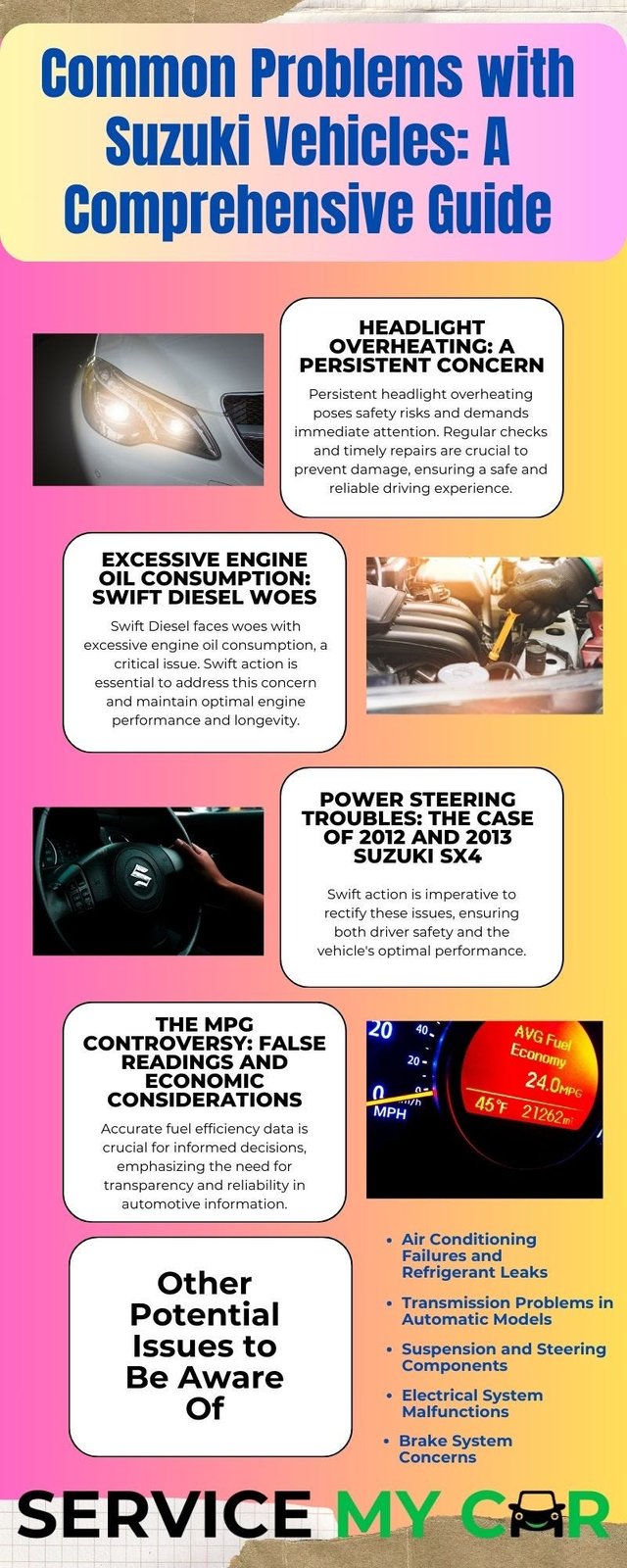Common Problems with Suzuki Vehicles: A Comprehensive Guide

Suzuki vehicles have long been recognized for their reliability, but like any car, they are not immune to issues. Whether you already own a Suzuki or are considering buying one, it’s crucial to be aware of the most common problems that can arise. By familiarizing yourself with these issues, you can detect and address them early on, preventing more significant damage and costly repairs. In this guide, we will explore the most prevalent problems encountered in Suzuki vehicles, providing you with valuable insights to keep your car running smoothly.
Headlight Overheating: A Persistent Concern
One common issue that Suzuki vehicles, particularly the Grand Vitara, face is headlights overheating. This problem is often attributed to a defective electrical system, which causes the headlights to burn out frequently and prematurely. Of particular concern are the daytime running lights, as the system can generate excessive heat, posing a fire risk. It is crucial to address this issue promptly to ensure your safety on the road.
Excessive Engine Oil Consumption: Swift Diesel Woes
Another prevalent problem observed in certain Suzuki models, such as the Swift diesel (both first and second generation), is excessive engine oil consumption. Owners have reported that their vehicles consume oil at a faster rate than normal, even after routine servicing. This issue is typically caused by head gasket problems and should be addressed promptly to avoid more severe engine damage. Neglecting this issue may lead to costly repairs and potential safety hazards.
Power Steering Troubles: The Case of 2012 and 2013 Suzuki SX4
Owners of the 2012 and 2013 Suzuki SX4 have reported issues with the power steering system, particularly during cold weather conditions. Problems with the power steering pumps can result in poor performance and potentially compromise the vehicle’s steering, leading to hazardous driving situations. Suzuki acknowledged this problem and issued a recall, but it is essential to check the repair history if you own or plan to purchase one of these models.
The MPG Controversy: False Readings and Economic Considerations
Suzuki faced criticism for incorrect MPG (miles per gallon) readings, which were later found to be the result of an erroneous test. Millions of Suzuki vehicles were providing inflated MPG readings due to the incorrect calculation method employed by the company. While this issue does not directly affect the driving experience, it is crucial to consider accurate fuel efficiency information when looking for an economical vehicle for your daily commute.
Other Potential Issues to Be Aware Of
In addition to the aforementioned common problems, there are a few other issues that Suzuki owners should be mindful of. These include:
1. Air Conditioning Failures and Refrigerant Leaks
Some Suzuki models have been reported to experience air conditioning failures, often due to refrigerant leaks. It is essential to have your vehicle’s air conditioning system regularly inspected and maintained to avoid discomfort during hot weather and costly repairs.
2. Transmission Problems in Automatic Models
Certain Suzuki models equipped with automatic transmissions have experienced issues, such as rough shifting or transmission failure. Regular maintenance and periodic inspections can help detect and address these problems before they escalate.
3. Suspension and Steering Components
Suzuki vehicles, like any other car, may encounter problems with suspension and steering components over time. Worn-out bushings, ball joints, and tie rod ends can result in poor handling and compromised safety. Regular inspections and proactive maintenance can prolong the lifespan of these components and prevent potential issues.
4. Electrical System Malfunctions
Electrical system malfunctions can occur in Suzuki vehicles, causing various issues such as malfunctioning windows, door locks, or faulty dashboard displays. These problems may be due to wiring issues, blown fuses, or faulty switches. Regular diagnostics and prompt repairs can help maintain the functionality of the electrical system.
5. Brake System Concerns
While Suzuki vehicles generally have reliable brake systems, it is crucial to regularly inspect and maintain them. Brake pad and rotor wear, as well as brake fluid contamination, can compromise braking performance and increase stopping distances. Timely maintenance and proactive replacement of worn-out components are essential for optimal safety on the road.
If you have problem with brake pad then Service My Car provides top-notch car brake pad replacement service. Our expert technicians provide meticulous service, ensuring efficient removal and installation. With a commitment to safety and performance, we deliver reliable brake solutions for your vehicle. Trust us for professional care and a smoother, safer driving experience.
Conclusion
Suzuki vehicles have a reputation for reliability, but it is essential to be aware of common problems that may arise. By staying informed about issues such as headlight overheating, excessive engine oil consumption, power steering troubles, and the MPG controversy, you can take proactive measures to address these concerns promptly. Additionally, being mindful of other potential issues like air conditioning failures, transmission problems, suspension and steering component wear, electrical system malfunctions, and brake system concerns can help maintain the longevity and performance of your Suzuki vehicle. Regular maintenance, timely repairs, and professional servicing are key to ensuring a trouble-free driving experience.